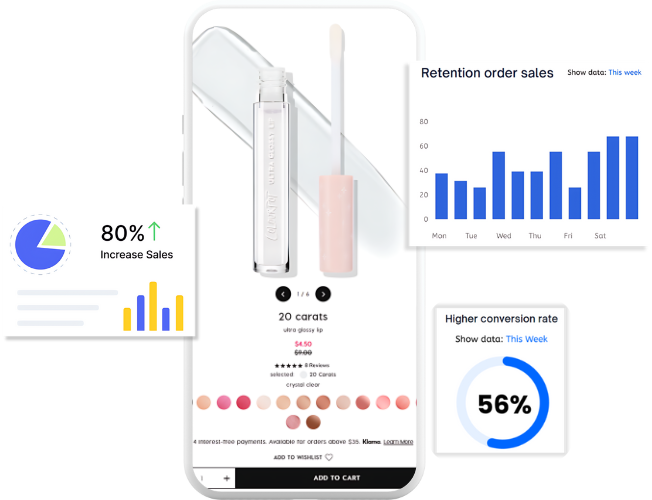We are living in a time when people purchase more products online than buying products in an actual store. The e-commerce industry has grown to a level that we have never imagined. In this environment, all merchants are trying their best to provide the best shopping experience for their customers.
To improve the shopping experience, the first and most important thing to think about is choosing an enterprise e-commerce platform. On this page, we will provide you with a detailed introduction to enterprise e-commerce platforms and recommend some top ones.

What is an enterprise e-commerce platform?
Many people get confused when it comes to the term ‘Enterprise e-commerce platform’, even many online store owners have little idea of an enterprise e-commerce platform. Actually, it is easy to understand. An enterprise e-commerce platform is software that aims to provide easy access to all aspects of a merchant’s online retail business.
It helps online store owners to manage their stores in a more efficient way and prompt sales. The reason why an enterprise e-commerce platform is so comprehensive is that there is an integrated suite of all kinds of applications. These applications work in all situations from sending emails automatically to data analysis.
As the business grows larger, it takes a lot of effort to manage your store. Sometimes, the business becomes unmanageable by a small group of staff, and here comes enterprise e-commerce platforms. An enterprise e-commerce platform greatly increases the scalability of your business and maintains a robust infrastructure.
There are several different types of enterprise e-commerce platforms, which will be introduced on this page. These enterprise software are highly customizable in general, therefore, merchants can modify their enterprise software to match their needs.
Benefits of top enterprise e-commerce platforms
Powerful security features
Many enterprise e-commerce platforms offer powerful security solutions like continuous security validation. For instance, many eliminate shared code conventions, which raises auditing costs, and security risks and protect the interests of the store owner. It’s always essential to prevent data leaks, especially sensitive customer data. Therefore, you should use an enterprise e-commerce platform to better protect your customer data.
Streamlined customer experience
There are many more effective ways to expose your products to your potential customers than just showing them in your online store. Applications on enterprise e-commerce platforms help you to enrich the interaction between your brand and your potential customers. Nowadays, people are spending a great deal of time on social media, which makes social media a perfect place to advertise your products.
Better performance
Imagine your online store goes offline, you might miss out on a lot of sales that you could have made. Similarly, if your website is very sluggish and keeps customers waiting, you are very likely to lose potential customers. Therefore, enterprise e-commerce platforms enable you to manage traffic peaks while maintaining the smoothness of the shopping experience.
Selling across multiple channels
Successful brands are selling on multiple channels. Traditional channels are Amazon, eBay, Alibaba and so on. Nowadays, there are more innovative channels such as TikTok and Instagram, that generate a great number of sales. Merchants should not neglect the power of non-conventional channels. In the enterprise e-commerce platform, there are many tools that support multi-channel marketing and sales.
Strong analytics
Powerful analysis applications on enterprise e-commerce platforms give you a grand picture of your business. It helps you to better manage your inventory, plan your marketing distribution and make better business decisions. The most used business intelligence software on enterprise e-commerce platforms is the enterprise resource planning (ERP) tools.
7 Types of enterprise e-commerce platforms
1. On-site enterprise solution
On-site enterprise e-commerce platforms store their data in a server at a physical location. This type of enterprise e-commerce platform is normally open source, which leaves your development team complete control over your code. Allowing merchants to have the flexibility of your solution. Many merchants customize their solutions to match their needs.
However, given that it is an on-site solution, the biggest downside of it is the cost of maintenance. Research shows that the average maintenance costs are over $200,000 a year.
Explore TrackingMore’s enterprise solutions→
2. Cloud-based e-commerce platform
A cloud-based e-commerce platform works in a very similar way to an on-site e-commerce platform. The difference between a cloud-based e-commerce platform and an on-site e-commerce platform is the location where they store the data. A cloud-based e-commerce platform stores the data in the cloud, without involving an actual physical location.
The average cost of maintaining a cloud-based e-commerce platform is slightly less than that of an on-site e-commerce platform, costing $170,000 a year.
However, the good thing about it is that you can lease the infrastructure from a proven provider, similar to how Hardware-as-a-Service (HaaS) allows businesses to rent essential hardware instead of making large upfront investments.
3. SaaS enterprise e-commerce solution
SaaS is short for software-as-a-service. A SaaS enterprise e-commerce solution can manage everything relating to your online store. Merchants can simply rent server space that satisfies themselves.
A SaaS enterprise e-commerce solution also allows you to customize your store and provide comprehensive front-end functionality. It is very friendly to merchants who do not know how to code since it does the technical part for you. Meanwhile, you have less control over the back-end control.
4. Open-source enterprise e-commerce solution
Open-source enterprise e-commerce solutions are open to the public, meaning everything can get access to it. Sometimes, you can use them for free, but in most cases, you will have to pay for them. The downside is that you have to do a lot of coding by yourself. It could be very difficult if you want to customer eyes your store with multiple advanced functions.
Using an open-source enterprise e-commerce solution could be higher than using a SaaS enterprise e-commerce solution. Before making a decision about whether you should use an open-source enterprise economy solution, you should ask yourself, do you really need extra control over the code or not.
5. Headless enterprise e-commerce solution
Using a headless enterprise e-commerce solution is very similar to using a SaaS enterprise e-commerce solution. What makes it different is that it separates the front-end and the back-end functionality. It emphasizes the flexibility of the front-end experience, so-called ‘the head’.
However, the headless and API-oriented site architecture does not guarantee performance. If you add many components to the front end, it is very likely that a failure could occur.
6. Modular commerce platforms
Modular commerce platforms allow you to add modules that you like to your store. The modular e-commerce platform is comprised of multiple interconnected modules. You can easily add, delete and replace modules in your online store.
Due to the nature of a modular commerce architecture, each module works separately. With a modular commerce platform, you can make the best use of your creativity and innovation to design your store.
7. Composable commerce platforms
Composable commerce platforms are very similar to modular commerce platforms. A composable commerce platform is formed of modular blocks. You can utilise the designs that vendors provide and customise your e-commerce platform.
You can use the packaged business capabilities (PBCs) for every part of the online store, including, store design, cart, payments, checkout, catalogue and promotions.
How to choose the right enterprise e-commerce platform
After reading the previous part of the page, many merchants are very intrigued with enterprise e-commerce platforms. Still, at the same time, you may wonder what you should consider when choosing an enterprise e-commerce platform. In the following part, we will provide you with several significantly important aspects you should consider before making your decision.
Scalability
You need to first take a look at your online business. How big is your business? How fast is your business growing? Are you expecting increasing traffic and transactions in the near future? After figuring these questions out, you need to make sure the enterprise e-commerce platform you choose match your scale and could grow with your business.
Functionality and feature
You need to assess the functionality offered by the enterprise e-commerce platform and check if all the functions that you need for your business are accessible on that platform. If you don’t know what kind of functionality that your business requires, there are a couple of basic functions that almost all online stores would find it useful.
Integration capabilities
Integrated applications are very important to an enterprise e-commerce platform. Some enterprise e-commerce platforms are integrated with more applications and some less. You really need to do some research on whether the applications that you wish to use are applicable on the enterprise e-commerce platform that you choose.
User-friendly interface
Since you will be dealing with all kinds of operations related to your online business, you would like to use an enterprise e-commerce platform that is easy to use. Some enterprise e-commerce platforms allow you to customize your own interface, but that might require a bit of coding skills.
Performance and speed
According to research, tedious loading time is the dominant reason for driving customers away. Therefore, you need to choose an enterprise e-commerce platform that guarantees a strong performance and speed.
Overview of the 7 best enterprise e-commerce platforms in 2025
There are many popular enterprise e-commerce platforms in the market, and they all have pros and cons. In this section, we will provide a brief overview of the 7 best enterprise e-commerce platforms in 2025.
1. Shopify:
Shopify is a very strong all-in-one e-commerce platform and one of the most popular e-commerce platforms. Shopify offers merchants with a high level of flexibility to match their requirements and demands.
There are many merchants building modular storefronts on Shopify, but now, there are more and more store owners turning to Shopify’s composable commerce and headless solutions.
2. BigCommerce Enterprise:
BigCommerce is a combination of SaaS and open-source systems. It is an open SaaS e-commerce solution. BigCommerce is taking a big share in the international market, which is a key selling point targeting merchants that want to go international. With a wide range of applicable applications integrated, BigCommerce can certainly help you scale and prompt your managing efficiency.
3. Adobe Commerce:
New beginners in the e-commerce industry might not be familiar with Adobe Commerce, but they definitely have heard of the name ‘Magento’ before. Adobe Commerce is formerly known as Magento Commerce.
Adobe Commerce is an enterprise e-commerce solution that works on multiple channels. It is highly customizable and are developed to meet complex demands for an online business.
4. Salesforce Commerce Could
As the name suggested, Salesforce Commerce Could is a cloud-based enterprise e-commerce platform. With the increasing calculating speed on the cloud, Salesforce Commerce Could allow merchants to analyse and manage their inventory in a blink. Meanwhile, Salesforce Commerce Could also provide merchants with omnichannel order management.
However, you have to own no less than 5 online stores to be qualified at the enterprise level to unlock some functionalities.
5. SAP Hybris Commerce:
SAP Hybris Commerce is an enterprise e-commerce platform that allows you to have more control over the customer experience. SAP Hybris Commerce charges $4,500 every month at the basic level and if you choose a more advanced plan, the subscription fee increases.
However, for small and medium-sized online enterprises, the subscription fee is a bit too high. Additionally, SAP Hybris Commerce may offer more features than merchants really need.
6. Oracle CX Commerce:
Oracle CX Commerce, formerly known as Oracle Commerce Cloud, offers a full tool case for merchants to manage their online business, which is very similar to SAP Hybris Commerce.
Oracle CX Commerce provides a brilliant experience on mobile phones. Nowadays, more customers are shopping via their mobile devices, therefore, it makes sense to equip them with the enterprise e-commerce platform that offers one of the best mobile experiences in the industry.
7. Wix:
Wix is a publicly listed software company that could-based services. With Wix, you can customize your store without being a professional developer, because Wix is very user-friendly. There are over 900 customizable templates at your disposal on the software.
You can simply drag and drop the modules that you like, which makes the designing part supper easy. Additionally, Wix also provides an array of marketing tools, such as email marketing and social media campaigns.
Outro
A good enterprise e-commerce platform could make it easy and seamless to manage your business and improve your sales. After reading this page, I believe you are very familiar with enterprise e-commerce platforms and how to choose the perfect one for your online business.
If you have any questions relating to the enterprise e-commerce platform, you can contact Channelwill, an all-in-one platform for e-commerce businesses. Their professional support team could help you with all kinds of problems relating to your online business.
FAQs About Enterprise E-commerce Platform
Note: This blog was originally written in English and translated using an automated tool to make the content accessible to a global audience. We believe in sharing valuable insights with everyone and apologize for any inaccuracies. If you spot any errors, please feel free to contact us for corrections. Your feedback helps us improve and ensures the content’s value is fully realized.

Zero Tan
Content Specialist
As an eCommerce content creator, I aim to share insights, trends, and strategies that may help you navigate the digital marketplace more effectively. My content is designed to provide practical value and inspiration, supporting your business growth and helping you stay informed about industry developments.




